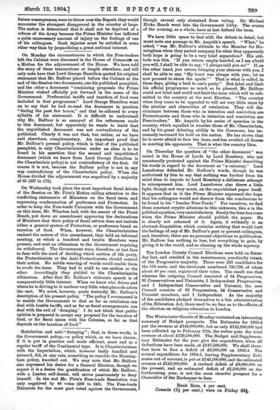On Wednesday took place the most important fiscal debate of
the Session on Mr. Pine's Motion calling attention to the conflicting statements of Ministers on the fiscal issue, and expressing condemnation of preference and Protection. In order to keep the Free-trade Unionists with the Government on this issue, Mr. Wharton had, with the assent of the Front Bench, put down an amendment approving the declarations of Ministers that their policy of fiscal reform does not include either a general system of Protection, or preference based on taxation of food. When, however, the Chamberlainites realised the nature of this amendment, they held an informal meeting, at which a hundred and twelve Members were present, and sent an ultimatum to the Government requiring its withdrawal. The Government were, therefore, at last face to face with the need of deciding which section of the party, the Protectionists or the Anti-Protectionists, should control their action. No subtle weaving of words could enable them to evade the issue. They had to yield to one section or the other. Accordingly they yielded to the Chamberlainite ultimatum. After that Mr. Balfour's elaborate speech is of comparatively little interest. When we know who drives and where he is driving to it matters very little what placards adorn the cart. We must, however, quote textually Mr. Balfour's description of his present policy. "The policy I recommend is to enable the Government to deal as far as retaliation can deal with hostile tariffs, and as far as fiscal arrangements can deal with the evil of 'dumping.' I do not think that public opinion is prepared to accept any proposal for the taxation of food, or for fiscal union with the Colonies, so far as that depends on the taxation of food."










































 Previous page
Previous page